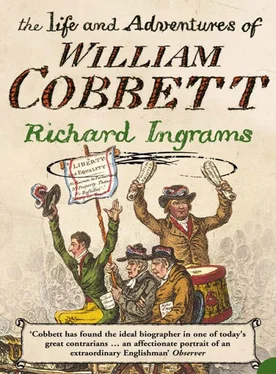Cobbett called his little autobiography The Life and Adventures of Peter Porcupine , an indication that he saw some similarity in his early career to a traditional romance or fairy tale, at the beginning of which the young hero sets out from home in search of fame and fortune. ‘It was on the sixth of May 1783,’ he writes, ‘that I, like Don Quixote sallied forth to seek adventures. I was dressed in my holiday clothes in order to accompany two or three lasses to Guildford fair. They were to assemble at a house about three miles from my home, where I was to attend them; but, unfortunately for me, I had to cross the London Turnpike Road. The stage-coach had just turned the summit of a hill and was rattling down towards me at a merry rate. The notion of going to London never entered my mind till this very moment, yet the step was completely determined on, before the coach came to the spot where I stood. Up I got and was in London about nine o’clock in the evening.’ (The account is contradictory as, according to the second sentence, Cobbett had not originally set out to seek adventures but with the more mundane intention of going to Guildford fair – which suggests that his leaving home was possibly not so impulsive as he would like us to believe.)
Looking back on his life, Cobbett records in two separate contexts that he had always been not only happy, but also lucky. So, arriving in London without baggage and only the small amount of money he had saved for the fair, he was befriended by a hop-merchant who had had dealings with his father and who had travelled up to London with him on the coach. This benefactor, whose name Cobbett (typically) omits, took him into his own house and in the meantime wrote to Cobbett Senior, who in turn wrote to his son ordering him to return home at once. ‘I am ashamed to say,’ Cobbett writes, ‘that I was disobedient. It was the first time I had ever been so, and I have repented of it from that moment to this. Willingly would I have returned, but pride would not suffer me to do it. I feared the scoffs of my acquaintances more than the real evils that threatened me.’
Cobbett’s friend the hop-merchant reluctantly accepted that the young man was not going home, and eventually got him a job working for a lawyer acquaintance in Gray’s Inn (he is identified only by his surname of Holland). ‘The next day,’ Cobbett writes, ‘saw me perched upon a great high stool in an obscure chamber in Grays Inn, endeavouring to decipher the crabbed draughts of my employer.’ He was to work nine months in the lawyer’s office, ‘from five in the morning till eight at night and sometimes all night long’. In the process he acquired the ability to write quickly and neatly in a clear hand – something that was to stand him in good stead later on (considering the speed at which he wrote, his manuscripts are not only legible but invariably clean, with minimal corrections). He was also able, thanks to this legal training, to write in a beautiful copperplate script.
It was the only benefit of his brief spell in Gray’s Inn. Otherwise he looked back on it as the least pleasurable period of his life. The office was gloomy and dark and the hours long. Sunday was the only break, and it was on a Sunday that when walking in St James’s Park he saw a poster appealing for recruits to the Royal Marines. Once again he acted on impulse, and without saying anything to his friends reported to Chatham where he accidentally enrolled not in the Marines but in the 54th Regiment, commanded by Lord Edward Fitzgerald and bound for service in New Brunswick, a province of Canada.
The pay was poor (2d a day) and the food barely adequate, but Cobbett enjoyed the army life mainly because he liked soldiers, and he formed many close friendships in the ranks (it was as a result of defending soldiers that he would be imprisoned in 1810). In addition, while stationed at Chatham he had time to embark on a crash course of self-education. He read voraciously all the books in the local library – novels, history, poetry and plays – and in the process absorbed enough knowledge of literature to be able, when the time came for him to write, to quote widely and to good effect. He learned by heart Oliver Goldsmith’s Deserted Village and The Traveller . From the start, his journalism is studded with references to the Bible, the plays of Shakespeare, the poems of Milton, Pope and many others, all of which he must have read during his army days. But stylistically it was Swift who most influenced him, as he influenced Paine and Hazlitt. Following Swift, these writers broke with the Johnsonian tradition of writing only for an educated audience (Swift used to read his books to his servants to make sure they were intelligible to the ordinary man). After his obsessive reading of A Tale of a Tub Cobbett must have read most of Swift’s works. It is no accident that his autobiography begins with an admirable quotation from Swift which he applies to himself: ‘The Celebrated Dean of St. Patrick somewhere observes that a man of talents no sooner emerges from obscurity than all the blockheads are instantly up in arms against him.’ Cobbett would also seem to have studied mathematics and geometry to a level at which he was able, when in Canada, to write a handbook on those subjects for teaching soldiers.
But it was the nowadays neglected subject of English grammar that especially absorbed him during his time at Chatham. Thanks to skills acquired in Gray’s Inn, Cobbett was taken on as a copyist by the Commandant of the Garrison Colonel (later General) Hugh Debbieg. Cobbett does not say as much (and does not even spell his name correctly), but Debbieg (1731–1810) was a very distinguished engineer and soldier who had served in France and Canada and had been in charge of the defences of all public buildings during the Gordon riots in London in 1780. Recognising Cobbett’s exceptional abilities, he urged him to improve himself in the business of writing, promising him promotion in exchange. Debbieg gave him a popular handbook, A Short Introduction to English Grammar by Robert Lowth, and he proceeded to learn the entire book by heart, by writing it out three times, reciting it to himself in its entirety when on guard duty. ‘The edge of my berth, or that of the guard-bed was my seat to study in; my knapsack was my bookcase; a bit of board lying in my lap was my writing desk … I had to read and to write amidst the talking, laughing, singing, whistling and brawling of at least half a score of the most thoughtless of men, and that too in their hours of freedom from all control.’
Cobbett eventually won his promotion from Debbieg and became a corporal, ‘which brought me a clear two-pence per diem and put a very clever Worsted Knot on my shoulder too’. Corporal Cobbett sailed with his regiment in 1785, and after landing in Nova Scotia, where he remained for a few weeks, proceeded to St John in New Brunswick. It was, according to the traveller Isaac Weld, ‘a garrison town’ containing ‘about fifty miserable wooden dwellings and barracks’. Cobbett was to be stationed there for six months before moving a hundred miles up the St John River to Fredericton. In his account of these years he says very little about his military duties, which suggests that they were never very arduous. There was a great deal of drinking: ‘Rum was seven pence a quart … and not one single man, out of three or four hundred was sober for a week – except myself.’ The regiment’s role was supposedly to guard the frontier with America – an almost impossible task. New Brunswick was a sparsely populated province (a haven for British and French settlers and native Indians, and a refuge for loyalist Americans fleeing from the south), and consisted of huge forests with hardly any roads. Journeys had to be made on the network of rivers and lakes that crisscrossed the land, by canoe in summer and by sledge in the long, hard winter.
Читать дальше











